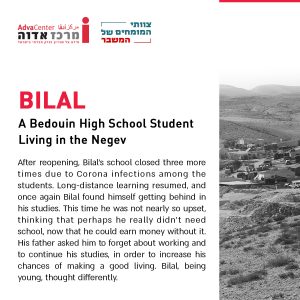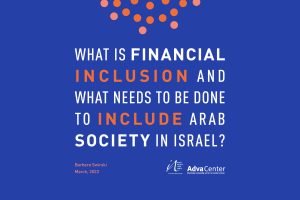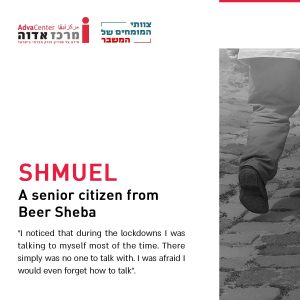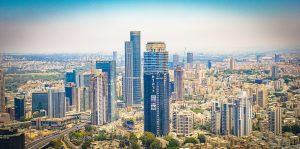The story of what happened to Bilal, a teenager from an “unrecognized” village, during the Corona crisis reflects the changes that occurred in the daily lives of young Bedouins living in the Negev. The character is based on the experience of a real person
Even before the Corona outbreak, Bedouin Arabs residing in “unrecognized” villages constituted the most marginal population group in Israel, about which official figures were partial at best. Young people in those villages grew up in a completely different reality from that of other youth in Israel. For this reason, education was considered the main avenue of social mobility.
Background: Bilal is 16 years old. He lives in a small “unrecognized” [1]village built on land in the possession of his extended family, near one of the “recognized” Bedouin settlements. He is the second among eight children. His father works as a mechanic in a garage in Beer Sheba, and his mother is a housewife. His big brother works with his dad at the garage.
Bilal is in the tenth grade in a high school located in the recognized village nearest his home. He is the first in his extended family to study in high school, and as such, he serves as a model for his younger siblings. Bilal gets to school in a school bus that picks up young people from several other villages and brings them to high schools in recognized villages – the only ones that have high schools. The bus picks him up at a spot some ten minutes from his home. Often the bus comes early and Bilal misses it; then he needs to walk to school, which is about three quarters of an hour away. On rainy days he needs to cross a dry river bed that has filled with water. Usually he is picked up early and arrives at school at seven in the morning instead of at eight, when school begins. On the way back home, the bus collects Bilal not when school ends but later, at three o’clock in the afternoon. If the weather is good, Bilal prefers to walk home rather than wait for the bus and take the long, circuitous ride that will eventually bring him home.
Bilal was a very good student, highly motivated to do well in school. This is not something to be taken for granted, for the obstacles to learning were numerous. With seven siblings at home, he had a hard time finding a quiet corner where he could do his homework. Bilal’s efforts to excel and to complete all of his assignments often led to fights between him and his brothers and sisters.
Bilal’s ambition was to continue his studies after completing high school in order to become a dentist, a profession he thought would enable him to make a good living and get ahead in life – and also to be helpful to family members, many of whom were suffering from dental problems.
Bilal’s teachers, most of them Bedouins, love their charges and do their best to help them get ahead.
What happened to Bilal during the Corona epidemic?
During the Corona epidemic, Bedouin schools in the Negev, like other schools in Israel, were closed most of the time. At first, Bilal enjoyed being away from school and spent long hours playing soccer and other games with his cousins. However, after about a month he began to feel he was losing something – schoolwork that would enable him to get ahead.
In the meantime, the teachers organized to continue teaching via Zoom. Many of the students from the recognized town in which the high school was located had computers at home (but not necessarily a computer for each child) and were connected to the internet. However, in the “unrecognized” villages students did not have computers and there was no infrastructure to connect to the internet. Like other students in the “unrecognized villages,” Bilal did not own a computer. He did have a smart phone, and some of the teachers tried to give lessons via the phone for students from “unrecognized” villages. However, this did not work very well: there were frequent lapses in reception, during which the students missed the teachers’ explanations, and when reception resumed, they could not ask questions because the teachers were already onto other subjects. The situation was especially problematic in math and English, both vital to success in the matriculation exams and to admission to colleges and universities. Discouraged, Bilal called one of his teachers on the telephone and asked how he could possibly learn anything under such conditions.
After a while, Bilal despaired of learning anything. Like other young men in his situation, he looked for – and found – low-wage work. His father allowed him to keep some of the money he earned. The fact that within a short time Bilal had money in his pocket lowered his motivation to learn even more. He felt older and manlier, having discovered that he could earn money on his own.
What happened after the third lockdown?
Bilal’s school reopened in March 2021 and he went back to school. However, within a short time, nearly half the class, including Bilal, contracted the Corona virus. The young people did not suffer much; Bilal was weak with a fever for a few days, but most of his extended family was infected and some of the adults became seriously ill. His grandfather was hospitalized for a month, and when he returned, he was not as hale and healthy as he had been before.
After reopening, Bilal’s school closed three more times due to Corona infections among the students. Long-distance learning resumed, and once again Bilal found himself getting behind in his studies. This time he was not nearly so upset, thinking that perhaps he really didn’t need school, now that he could earn money without it. His father asked him to forget about working and to continue his studies, in order to increase his chances of making a good living. Bilal, being young, thought differently.
What about the future? For the time being, it appears that the Corona epidemic has put an end to Bilal’s plans to excel in school, to get into a university and to study dentistry. Perhaps things will change with time and he will see the light and manage to catch up – and perhaps not.
[1] “Recognized” villages are those endowed with official status by the Israeli government; they include the city of Rahat, 6 towns, and 2 regional councils that encompass 12 small villages. The rest of the Bedouin settlements in the Negev, containing some 80,000 residents, have no official status and are thus termed “unrecognized” villages.






